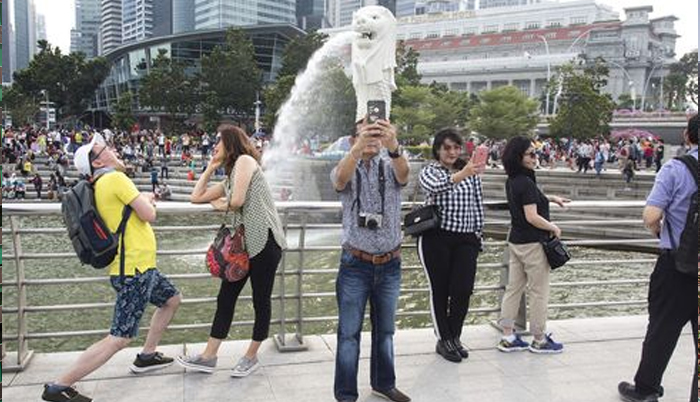![]() Home > World Business
Home > World Business
Singapore Matches More Problems With More Money: Budget Snapshot

![]() February 20th, 2018 | 09:39 AM |
February 20th, 2018 | 09:39 AM | ![]() 1090 views
1090 views
SINGAPORE
Singapore’s budget on Monday was all about boosting government revenue through higher taxes in order to pay for rising spending needs.
While the city state has substantial reserves that it draws on to help fund the budget, that’s not a long-term solution for a fiscally conservative government like Singapore’s. Finance Minister Heng Swee Keat said authorities must act prudently as the economy matures and the population ages, outlining a range of tax increases, including on property, consumption and online services, such as video streaming.
Here are five charts that give the highlights of the budget:
The much-anticipated goods-and-services tax increase was indeed delivered, with Heng announcing plans for a boost to 9 percent from the current 7 percent rate, sometime in the period from 2021 to 2025. GST hasn’t been raised since 2007 and the delayed implementation allows Singaporeans to adjust to the changes ahead of an election that must be held by April 2021.
The government estimates that an increase of 2 percentage points in the GST will provide additional revenue of almost 0.7 percent of gross domestic product each year.
The short story on the balance sheet: The government sees a bigger surplus for the current fiscal year ending March 31, while projecting a slight deficit in the financial year to come. The surplus on the primary budget, which excludes investment returns on government reserves, breaks a two-year streak of spending outpacing revenues.
Singapore will take in more revenue from corporate and personal income taxes in the coming year, with the corporate levies bringing in the bulk of payments of any single tax at about S$15 billion, the government estimated. The goods and services tax and motor vehicle levies will also bring in more money, while revenue from stamp duties are set to ease, even though the top marginal rate was raised for properties above S$1 million.
Defense will retain the biggest single-sector share of expenditures in 2018, with transportation and education almost matching that portion. A key priority in coming years will be spending on healthcare, which Heng said has more than doubled since the start of the decade to S$10.2 billion in the 2018 fiscal year. Average annual healthcare spending is set to rise to almost 3 percent of GDP over the next decade from 2.2 percent currently as the population ages rapidly.
He also highlighted higher expenditure on security and public projects, including housing and railways. Infrastructure spending is set to climb to S$20 billion in the coming fiscal year.
Singapore’s net investment returns -- or interest earned on its healthy reserves -- now make up the biggest contributor to the government’s revenues, Heng said. The projected amount in the fiscal year beginning April 1 is almost S$16 billion, more than double the contribution of S$7 billion in 2009.
The increasing reliance on reserves to finance the budget has been a sore point for Heng and other government officials, who want those funds to be used for emergencies rather than daily spending.
“Now that our economy is maturing, and our population is aging, we must husband this resource carefully, prudently and responsibly,” said Heng.
Source:
courtesy of BLOOMBERG
by Michelle Jamrisko and Myungshin Cho
If you have any stories or news that you would like to share with the global online community, please feel free to share it with us by contacting us directly at [email protected]